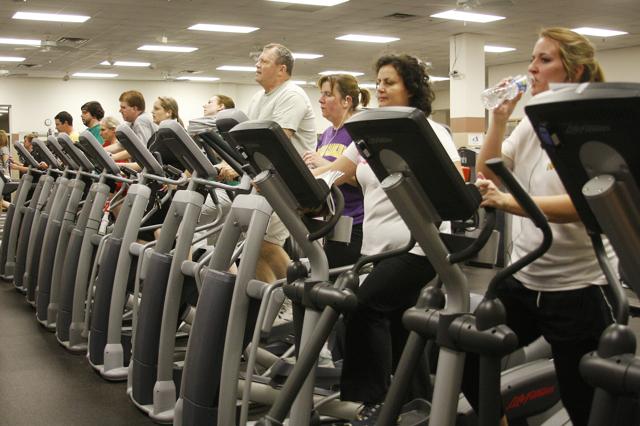- NATHANEAL: SUGGESTED PIX, WE’LL RUN AS MANY AS WE CAN (up to 6?) and SAVE OTHERS FOR FEB. 2; I WANT TO USE SOME OF JERRY N.’s TOO /mvw photos by Jonathan Welch
- photo by Jonathan Welch
Health is always a complicated picture, and gauging the overall health of Buncombe County residents offers no exception. Rated one of the best in the state in access (with Mission Hospitals sometimes lauded nationwide), the county nonetheless witnesses rising numbers of the uninsured, whose ranks have more than doubled in the past 15 years. Especially in mental-health care, more people than ever say they can't get access due to a lack of money or insurance.
At the same time, Buncombe's (relatively) good picture on access has to be measured against an increasingly heavy (and obese, in some cases) population, with high levels of smoking and more than a third of its residents reporting their health as “fair” to “poor,” much higher than the state average.
Below, a numerical breakdown of the county's health, from a variety of sources:
Access
• 12 percent needed medication but couldn't get it in the past year.
• No. 3: where Buncombe ranks in access to health care among North Carolina's 100 counties.
• 8.6 percent didn't have health insurance in 1995.
• 17.5 percent didn't have health insurance in 2010; the state average is 15.9 percent.
• 5.5 psychologists per 10,000 people; the state average is 2.
• 35 physicians per 10,000 people; the state average is 20.
• 75 percent have had a routine checkup in the past year.
• Of those who didn't get medical care when they last needed it, 70 percent said the main reason was a lack of money or insurance.
• 10 percent needed mental-health counseling in the past year, but couldn't get it. Of those, 61.5 percent said the main reason was a lack of insurance or funds.
General health
• 32.9 percent perceive health status as “fair” or “poor.” The state average is 19 percent.
• Those making less than $50,000 a year in Buncombe are roughly 10 times more likely to report “fair” or “poor” health than those making more than $50,000 a year.
• 25.6 percent of people in Buncombe County smoke, compared to 20.3 percent statewide and 17.9 percent nationwide.
• 19 percent smoke every day; the state average is 17 percent.
• 59.6 percent of high school students use tobacco in some form, slightly higher than the state average.
• 1 in 4 high school students in the western region were offered, sold or given illicit drugs by someone on school property in 2009.
• 19 percent of high school students in Buncombe County Schools used marijuana in the past 30 days.
• 64 percent visited a dentist in the past year.
• 57.5 percent of adults are overweight, using Body Mass Index calculations.
• 28 percent of kindergarteners are overweight, increasing each year to 39 percent of fifth graders, using BMI calculations.
• 50 percent received a flu shot in the past year.
• 11.2 percent got no exercise in the past week.
• 14 percent of adults participated in binge drinking in the past 30 days, compared to the state average of 12.8 percent and a nationwide average of 15.8 percent.
• 21 percent of Buncombe County high school students participated in binge drinking in the past 30 days. The North Carolina average is 35 percent, while the nationwide average is 41.8 percent.
• The teen birth rate is 46 per 1,000 births in Buncombe; the state average is 51.
• No 25: where Buncombe ranks in overall health among North Carolina's 100 counties.
Death
• 50 percent: the approximate amount of deaths in Buncombe attributed to heart disease, cancer, stroke and lung disease (comparable to the state average).
• The motor-vehicle-crash death rate is 14 per 100,000, while the state average is 18.6.
• The leading cause of death in Buncombe is heart disease, which stands at 23.2 percent.
• 13.8 suicides per 100,000 people; the state average is 11.9.
• An African-American male in Buncombe who’s younger than 75 is 54 percent more likely to die than his white counterpart.
• More than one in 10: the death rate for whites due to lung cancer in Buncombe, which is one-third higher than for African-Americans.
• 5.8 infant deaths per 1,000 births in Buncombe, while the state average is 8.2, among the highest in the United States. African-American babies are almost twice as likely to die as white babies.
Diseases
• 14 cases of AIDS in Buncombe in 2010.
• 15 cases of HIV per 100,000 people; the state average is 21.7.
• 668 cases of chlamydia in Buncombe in 2010.
• 36 cases of whooping cough in Buncombe in 2010.
Hospital and clinical care
• More than 6,000 people are employed by Mission Hospitals.
• 773 beds are in the Mission system (as of 2007).
• $17.6 million: the budget for the Buncombe County Health Center for fiscal year 2010-11
• Of that, $4.6 million is spent on clinical-care services.
• 12,677 patients were seen by the Buncombe Health Center in 2009.
Sources: Buncombe County 2010 health assessment (which includes survey data), Buncombe County’s fiscal year 2010-11 operating budget, Mission Hospitals
— David Forbes can be reached at 251-1333, ext. 137, or dforbes@mountainx.com.







Before you comment
The comments section is here to provide a platform for civil dialogue on the issues we face together as a local community. Xpress is committed to offering this platform for all voices, but when the tone of the discussion gets nasty or strays off topic, we believe many people choose not to participate. Xpress editors are determined to moderate comments to ensure a constructive interchange is maintained. All comments judged not to be in keeping with the spirit of civil discourse will be removed and repeat violators will be banned. See here for our terms of service. Thank you for being part of this effort to promote respectful discussion.